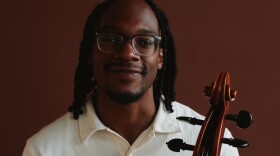College is expensive. It’s elitist. Enrollments are shrinking, along with state budgets for higher education.
These are just a few of the arguments against college these days. Added together, they beg the question: does the U.S. need public universities?
That’s a question Christopher Newfield has dedicated his academic life to exploring. The faculty member at UC-Santa Barbara teaches American Studies and Literature – but despite teaching fiction for the past 25 years, Newfield’s main area of research has been in higher education policy.
Newfield has spent a lot of time doing planning and budgeting within the Academic Senate on his campus, which is partly the empirical bases of his new book, The Great Mistake: How We Wrecked Public Universities and How We Can Fix Them.
He’ll delve into his thoughts on the modern struggles of public universities Tuesday night at UW-Milwaukee, for the College of Letters and Sciences' Dean’s Distinguished Lecture in the Humanities.
Ahead of his visit, Newfield spoke about his book with Lake Effect’s Rachel Morello. He described his ideas about the crisis of public universities -- which he says, he thinks we can fix.
On the "great mistake"
“The mistake was taking this great democratic institution, which was free college of a high quality, and making it expensive, and unequal and elitist. So that the accessible parts of the system – community colleges – stayed relatively affordable, but they got worse in terms of quality. And the great parts of the system became increasingly inaccessible – the flagships, [like] Milwaukee, Madison and so on.”
On his definition of "high-quality"
“High-quality means preparing people for non-routine, cognitive activities where they have to define problems, figure out the steps that they have to go through, change the definition of the problem if they learn new things.”
“For me, it’s kind of two stages. One is what’s sometimes called ‘mastery learning.’ And that means everybody in the class learns all of the material. It’s not just the few people who get A’s that do really well and master the subject; it’s the whole class.”
“The second phase is creativity learning…and that is preparing students for the society of today and tomorrow. It means having complex cognitive skills, where you can deal with ambiguous information, lots of grey areas, incomplete information or uncertain information.”
On his advice for the UW System consolidation
As a reminder: Wisconsin's public university system has begun the process of consolidating, folding its two-year colleges into its four-year institutions. UW-Milwaukee, where Newfield will visit Tuesday, will become the “hub” for a super-campus that will include UW-Waukesha and UW-Washington County.
Newfield says he’s a “pessimist” when it comes to reorganization. But, in order to make the transition smooth for students, he recommends focusing on what schools do best: teaching.
“One thing is to not be too distracted by the reorganization, and stay focused on the education. What’s actually happening in the classroom, in the laboratory, in the library can get neglected, and people aren’t giving their best thought to, ‘how can I improve learning here? How can redesign the curriculum?’ That’s the stuff that really counts, it’s not the bureaucratic reorganization.”
Christopher Newfield is also the author of “Unmaking the Public University: The Forty Year Assault on the Middle Class” and “Ivy and Industry: Business and the Making of the American University, 1880-1980.”
You can hear more from Newfield Tuesday night, when he’ll appear at UW-Milwaukee’s Golda Meir Library. The event begins at 4 p.m., and is free to the public.





